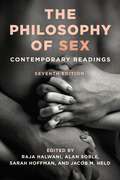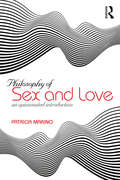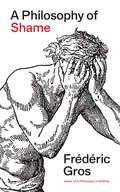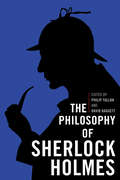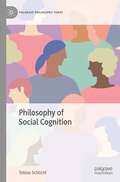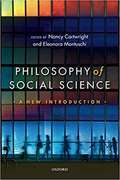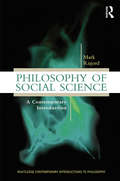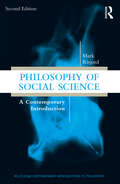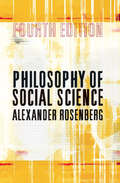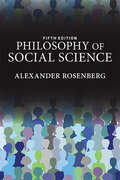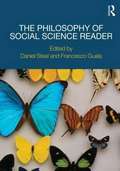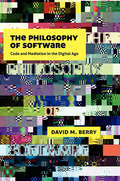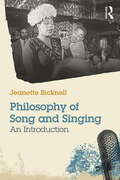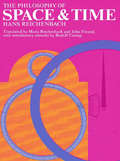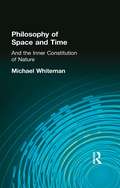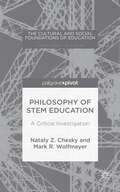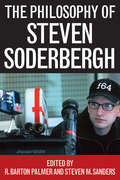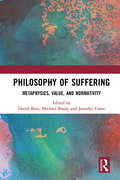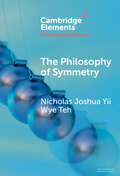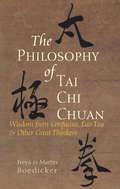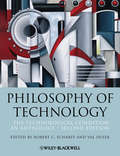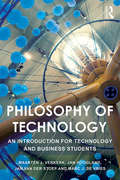- Table View
- List View
The Philosophy of Sex: Contemporary Readings
by Raja Halwani Alan Soble Sarah Hoffman Jacob HeldThe seventh edition of The Philosophy of Sex has quite a few changes. First, it has nine new essays specifically written for this volume: Talia Mae Bettcher's "Trans 101" and Burkay Ozturk's "The Negotiative Theory of Gender Identity and the Limits of First-Person Authority" deal with transgender issues, the former going over some basics and the latter questioning the view that a person has a non-defeasible epistemic and ethical decision regarding what their gender is. The seventh edition has three essays that are new to the volume, though they have been published elsewhere before and also has three revised essays from the sixth one.
Philosophy of Sex and Love: An Opinionated Introduction
by Patricia MarinoWriting for non-specialists and students as well as for fellow philosophers, this book explores some basic issues surrounding sex and love in today's world, among them consent, objectification, non-monogamy, racial stereotyping, and the need to reconcile contemporary expectations about gender equality with our beliefs about how love works. Author Patricia Marino argues that we cannot fully understand these issues by focusing only on individual desires and choices. Instead, we need to examine the social contexts within which choices are made and acquire their meanings. That perspective, she argues, is especially needed today, when the values of individualism, self-expression, and self-interest permeate our lives. Marino asks how we can fit these values, which govern so many areas of contemporary life, with the generosity, caring, and selflessness we expect in love and sex. Key Features of Philosophy of Sex and Love: An Opinionated Introduction Offers a contemporary, problems-based approach to the subject, helping readers better understand and address current issues and controversial questions Includes coverage of sex and love as they intersect with topics like disability, race, medicine, and economics Considers not only the ethical, but also the broadly social and political dimensions of sex and love Includes a helpful introduction and conclusion in each chapter and is written throughout in a clear and straightforward style, with examples and signposts to help guide the student and general reader A comprehensive and up-to-date bibliography provides a valuable tool for anyone’s further research
A Philosophy of Shame: A Revolutionary Emotion
by Frédéric GrosAn original reflection on shame as the central feeling of our age — the expression of an anger that is the necessary condition for new strugglesCan shame become a source of political strength? Faced with injustice, growing inequality and systemic violence, we cry out in shame. We feel ashamed of obscene wealth amid wider deprivation. We feel ashamed of humanity for its ruthless and relentless exploitation of the earth. We feel ashamed of the racism and sexism that permeate society and our everyday lives.This difficult emotion is not just sadness or a withdrawal into oneself, nor is it a paralysing sense of inadequacy. As Frédéric Gros argues in A Philosophy of Shame, it arises when our perception of reality rejects passivity and resignation and instead embraces imagination. Shame thus becomes the expression of an anger that is a powerful, transformative force —one that assumes a radical character.In dialogue with authors such as Primo Levi, Annie Ernaux, Virginie Despentes and James Baldwin, Gros explores a concept that is still little understood in its anthropological, moral, psychological and political depths. Shame is a revolutionary sentiment because it lies at the foundation of any path of subjective recognition, transformation and struggle.
The Philosophy of Sherlock Holmes (The Philosophy of Popular Culture)
by Philip Tallon and David BaggettEssays about the famed fictional detective and the mysteries of life: &“Both elegantly erudite and consistently entertaining&” (E. J. Wagner, Edgar Award–winning author of The Science of Sherlock Holmes). Sir Arthur Conan Doyle&’s detective has stood as a unique figure for more than a century with his reliance on logical rigor, his analytic precision, and his disregard of social mores. A true classic, the Sherlock Holmes character continues to entertain twenty-first-century audiences on the page, stage, and screen. In The Philosophy of Sherlock Holmes, a team of leading scholars uses the beloved character as a window into the quandaries of existence, from questions of reality to the search for knowledge. The essays explore the sleuth&’s role in revealing some of the world's most fundamental philosophical issues, discussing subjects such as the nature of deception, the lessons enemies can teach us, Holmes&’s own potential for criminality, and the detective&’s unique but effective style of inductive reasoning. Emphasizing the philosophical debates raised by generations of devoted fans, this intriguing volume will be of interest to philosophers and Holmes enthusiasts alike.
Philosophy of Social Cognition (Palgrave Philosophy Today)
by Tobias SchlichtThis introductory textbook provides a comprehensive and up-to-date overview of the main issues in contemporary philosophy of social cognition. It explains and critically discusses each of the key philosophical answers to the captivating question of how we understand the mental life of other sentient creatures. Key Features:· Clearly and fully describes the major theoretical approaches to the understanding of other people’s minds.· Suggests the major advantages and limitations of each approach, indicating how they differ as well as the ideas they have in common. · Tests each philosophical theory against the best available empirical data from psychology, neuroscience and psychopathology.· Includes suggestions for additional reading and practice study questions at the end of each chapter. Philosophy of Social Cognition is essential reading for all undergraduate and graduate students taking introductory courses on social cognition. It is also ideal for courses on cognitive neuroscience, social psychology and sociological theory.
Philosophy of Social Science: A New Introduction
by Nancy Cartwright Eleanora MontuschiThis is a much-needed new introduction to a field that has been transformed in recent years by exciting new subjects, ideas, and methods. It is designed both for students with central interests in philosophy and those planning to concentrate on the social sciences, and it presupposes no particular background in either domain. From the wide range of topics at the forefront of debate in philosophy of social science, the editors have chosen those which are representative of the most important and interesting contemporary work. A team of distinguished experts explore key aspects of the field such as social ontology (what are the things that social science studies?), objectivity, formal methods, measurement, and causal inference. Also included are chapters focused on notable subjects of social science research, such as well-being and climate change. Philosophy of Social Science provides a clear, accessible, and up-to-date guide to this fascinating field.
The Philosophy of Social Science: An introduction
by Martin HollisThis textbook by Martin Hollis offers an exceptionally clear and concise introduction to the philosophy of social science. It examines questions which give rise to fundamental philosophical issues. Are social structures better conceived of as systems of laws and forces, or as webs of meanings and practices? Is social action better viewed as rational behaviour, or as self-expression? By exploring such questions, the reader is led to reflect upon the nature of scientific method in social science. Is the aim to explain the social world after a manner worked out for the natural world, or to understand the social world from within?
Philosophy of Social Science: A Contemporary Introduction (Routledge Contemporary Introductions to Philosophy)
by Mark RisjordThe Philosophy of Social Science: A Contemporary Introduction examines the perennial questions of philosophy by engaging with the empirical study of society. The book offers a comprehensive overview of debates in the field, with special attention to questions arising from new research programs in the social sciences. The text uses detailed examples of social scientific research to motivate and illustrate the philosophical discussion. Topics include the relationship of social policy to social science, interpretive research, action explanation, game theory, social scientific accounts of norms, joint intentionality, reductionism, causal modeling, case study research, and experimentation.
Philosophy of Social Science: A Contemporary Introduction (Routledge Contemporary Introductions to Philosophy)
by Mark RisjordPhilosophy of Social Science: A Contemporary Introduction examines perennial questions of philosophy through engaging the empirical study of society. Questions of normativity concern the place of values in social scientific inquiry. Questions of naturalism concern the relationship between the natural and the social sciences. And questions of reductionism ask how social institutions relate to the people who constitute them. This accessible text offers a comprehensive overview of debates in the field, with special attention to new research programs. Topics include the relationship of social policy to social science, interpretive research, cognitive and evolutionary explanations, intentional action explanation, rational choice theory, conventions and social norms, joint intentionality, causal inference, and experimentation. Detailed examples of social scientific research motivate the philosophical questions and illustrate the important concepts. Treating philosophical commitments as implicit in social science, students of the social sciences will benefit from its application of philosophical argument to methodological and theoretical problems. The text argues that social science transforms philosophical questions, and students of philosophy will benefit from its direct engagement with contemporary debates. The Second Edition provides updates with the most recent literature and adds two new chapters: one on modeling and one on the role of race and gender in the social sciences. Key Updates to the Second Edition: A new chapter on "Modeling and Explaining," which explores how models represent social systems and whether highly idealized models explain A new chapter on "Race and Other Social Constructions," capturing much of the recent empirical research and philosophical interest in the social construction of categories like race and gender Revised and updated chapters throughout, clarifying earlier presentations and bringing discussions from the First Edition into line with new research Updated annotated Further Reading lists, which now include relevant publications from 2013 to 2022.
Philosophy of Social Science
by Alexander RosenbergPhilosophy of Social Science provides a tightly argued yet accessible introduction to the philosophical foundations of the human sciences, including economics, anthropology, sociology, political science, psychology, history, and the disciplines emerging at the intersections of these subjects with biology. Philosophy is unavoidable for social scientists because the choices they make in answering questions in their disciplines force them to take sides on philosophical matters. Conversely, the social and behavior sciences must inform philosophers’ understanding of human action, norms, and social institutions. The fourth edition retains an illuminating interpretation of the enduring relations between the social sciences and philosophy, and it has now been thoroughly revised to better fit courses, including fifteen chapters, with more effective transitions and helpful summaries. This edition also includes three new chapters on philosophical anthropology, functionalism as a research program, and theories of cultural evolution, as well as enhanced discussions of the role of norms and speech acts in social construction in interpretive social science and a chapter on continental philosophers of social science.
Philosophy of Social Science
by Alexander RosenbergRosenberg (philosophy, Duke U. ) introduces students to the philosophical foundations of the human sciences, including economics, anthropology, sociology, political science, psychology, history, and fields at the intersections of these subjects with biology. He discusses the relevance of philosophy, then the problems raised by alternative explanatory strategies, including behaviorism, structuralism, and interpretational theories like critical theory, as well as the relationship between social sciences and moral philosophy. Reorganized into 15 chapters, this edition has new chapters on philosophical anthropology, functionalism as a research program, and theories of cultural evolution; more on the role of norms and speech acts in social construction, including the work of John Searle; more on interpretive social science and continental philosophers with an expanded discussion of the critical theories of those such as Habermas, Foucault, and Bourdieu; new discussion of the role of models and equilibrium explanations in economics and the problem of spontaneous order in the creation of institutions; more on invisible hand explanations and rational choice theory in economics and political science; and an overview of Sen's capacities alternative to utilitarianism and Rawls' and other theories of development. Annotation ©2012 Book News, Inc. , Portland, OR (booknews. com)
Philosophy of Social Science
by Alexander RosenbergPhilosophy of Social Science provides a tightly argued yet accessible introduction to the philosophical foundations of the human sciences, including economics, anthropology, sociology, political science, psychology, history, and the disciplines emerging at the intersections of these subjects with biology. Philosophy is unavoidable for social scientists because the choices they make in answering questions in their disciplines force them to take sides on philosophical matters. Conversely, the social and behavior sciences must inform philosophers' understanding of human action, norms, and social institutions. The fourth edition retains an illuminating interpretation of the enduring relations between the social sciences and philosophy, and it has now been thoroughly revised to better fit courses, including fifteen chapters, with more effective transitions and helpful summaries. This edition also includes three new chapters on philosophical anthropology, functionalism as a research program, and theories of cultural evolution, as well as enhanced discussions of the role of norms and speech acts in social construction in interpretive social science and a chapter on continental philosophers of social science.
Philosophy of Social Science, Fifth Edition
by Alexander RosenbergPhilosophy of Social Science provides a tightly argued yet accessible introduction to the philosophical foundations of the human sciences, including economics, anthropology, sociology, political science, psychology, history, and the disciplines emerging at the intersections of these subjects with biology. Philosophy is unavoidable for social scientists because the choices they make in answering questions in their disciplines force them to take sides on philosophical matters. Conversely, the philosophy of social science is equally necessary for philosophers since the social and behavior sciences must inform their understanding of human action, norms, and social institutions. The fifth edition retains from previous editions an illuminating interpretation of the enduring relations between the social sciences and philosophy, and reflects on developments in social research over the past two decades that have informed and renewed debate in the philosophy of social science. An expanded discussion of philosophical anthropology and modern and postmodern critical theory is new for this edition.
The Philosophy of Social Science Reader
by Francesco Guala Daniel SteelThe Philosophy of Social Science Reader is an outstanding, comprehensive and up-to-date collection of key readings in the philosophy of social science, covering the essential issues, problems and debates in this important interdisciplinary area. Each section is carefully introduced by the editors, and the readings placed in context. The anthology is organized into seven clear parts: Values and Social Science Causal Inference and Explanation Interpretation Rationality and Choice Individualism Norms Cultural Evolution. Featuring the work of influential philosophers and social scientists such as Ernest Nagel, Ian Hacking, John Searle, Clifford Geertz, Daniel Kahneman, Steven Lukes and Richard Dawkins, The Philosophy of Social Science Reader is the ideal text for philosophy of social science courses, and for students in related disciplines interested in the differences between the social and natural sciences.
The Philosophy of Software: Code and Mediation in the Digital Age
by D. BerryThis book is a critical introduction to code and software that develops an understanding of its social and philosophical implications in the digital age. Written specifically for people interested in the subject from a non-technical background, the book provides a lively and interesting analysis of these new media forms.
A Philosophy of Song and Singing: An Introduction
by Jeanette BicknellIn Philosophy of Song and Singing: An Introduction, Jeanette Bicknell explores key aesthetic, ethical, and other philosophical questions that have not yet been thoroughly researched by philosophers, musicologists, or scientists. Issues addressed include: The relationship between the meaning of a song’s words and its music The performer’s role and the ensuing gender complications, social ontology, and personal identity The performer’s ethical obligations to audiences, composers, lyricists, and those for whom the material holds particular significance The metaphysical status of isolated solo performances compared to the continuous singing of opera or the interrupted singing of stage and screen musicals Each chapter focuses on one major musical example and includes several shorter discussions of other selections. All have been chosen for their illustrative power and their accessibility for any interested reader and are readily available.
The Philosophy of Space and Time
by Hans ReichenbachAn important landmark in the development of the empiricist conception of geometry, this book is still one of the clearest and most valuable expositions of the crisis in physical science and mathematics occasioned by the advent of the non-Euclidean geometries. With unusual depth and clarity, it covers the problem of the foundations of geometry, the theory of time, the theory and consequences of Einstein's relativity including: relations between theory and observations, coordinate definitions, relations between topological and metrical properties of space, the psychological problem of the possibility of a visual intuition of non-Euclidean structures, and many other important topics in modern science and philosophy.While some of the book utilizes mathematics of a somewhat advanced nature, the exposition is so careful and complete that most people familiar with the philosophy of science or some intermediate mathematics will understand the majority of the ideas and problems discussed.Partial CONTENTS: I. The Problem of Physical Geometry. Universal and Differential Forces. Visualization of Geometries. Spaces with non-Euclidean Topological Properties. Geometry as a Theory of Relations. II. The Difference between Space and Time. Simultaneity. Time Order. Unreal Sequences. Ill. The Problem of a Combined Theory of Space and Time. Construction of the Space-Time Metric. Lorentz and Einstein Contractions. Addition Theorem of Velocities. Principle of Equivalence. Einstein's Concept of the Problems of Rotation and Gravitation. Gravitation and Geometry. Riemannian Spaces. The Singular Nature of Time. Spatial Dimensions. Reality of Space and Time.
Philosophy of Space and Time: And the Inner Constitution of Nature
by Michael WhitemanThis is Volume XVII of seventeen in a series on Metaphysics. Originally published in 1967, this is a phenomenological study into the philosophy of space and time and the inner constitution of nature and the theory of everything being 'simply located'.
Philosophy of STEM Education: A Critical Investigation
by Nataly Z. Chesky Mark R. WolfmeyerFramed as educational equality initiatives that will help students gain the knowledge they need to compete in the global marketplace, STEM may be the most indicative educational reform discourse of our time and has grown to become one of the primary foci of educational policy, in part due to association with a wide array of today's industries: from information and communications technology to the medical field, to sustainability innovations. This book's primary focus is to shift the attention away from such utilitarian aims and ask critical questions about what aims the STEM initiatives are asking for and what assumptions do they hold about both teaching STEM and the nature of STEM content. In order to answer the above questions, the authors use a philosophical lens to study STEM policies as a political and social phenomenon.
The Philosophy of Steven Soderbergh (The Philosophy of Popular Culture #Ppcs)
by R. Barton Palmer and Steven M. Sanders&“Provocative, insightful, and instructive analysis of the cinematic and philosophical significance of Steven Soderbergh&’s work.&” —Jason Holt, editor of The Daily Show and Philosophy: Moments of Zen in the Art of Fake News Widely regarded as a turning point in American independent cinema, Steven Soderbergh's sex, lies, and videotape launched the career of its twenty-six-year-old director, whose debut film was nominated for an Academy Award and went on to win the Cannes Film Festival&’s top award, the Palme d&’Or. The Philosophy of Steven Soderbergh breaks new ground by investigating salient philosophical themes through the unique story lines and innovative approaches to filmmaking that distinguish this celebrated artist. Editors R. Barton Palmer and Steven M. Sanders have brought together leading scholars in philosophy and film studies for the first systematic analysis of Soderbergh&’s entire body of work, offering the first in-depth exploration of the philosophical ideas that form the basis of the work of one of the most commercially successful and consistently inventive filmmakers of our time.
Philosophy of Suffering: Metaphysics, Value, and Normativity
by David Bain Michael Brady Jennifer CornsSuffering is a central component of our lives. We suffer pain. We fall ill. We fail and are failed. Our loved ones die. It is a commonplace to think that suffering is, always and everywhere, bad. But might suffering also be good? If so, in what ways might suffering have positive, as well as negative, value? This important volume examines these questions and is the first comprehensive examination of suffering from a philosophical perspective. An outstanding roster of international contributors explore the nature of suffering, pain, and valence, as well as the value of suffering and the relationships between suffering, morality, and rationality. Philosophy of Suffering: Metaphysics, Value, and Normativity is essential reading for students and researchers in philosophy of mind, philosophy of psychology, cognitive and behavioral psychology as well as those in health and medicine researching conceptual issues regarding suffering and pain.
The Philosophy of Symmetry (Elements in the Philosophy of Physics)
by Nicholas Joshua Yii Wye TehThis Element is a concise, high-level introduction to the philosophy of physical symmetry. It begins with the notion of 'physical representation' (the kind of empirical representation of nature that we effect in doing physics), and then lays out the historically and conceptually central case of physical symmetry that frequently falls under the rubric of 'the Relativity Principle,' or 'Galileo's Ship.' This material is then used as a point of departure to explore the key hermeneutic challenge concerning physical symmetry in the past century, namely understanding the physical significance of the notion of 'local' gauge symmetry. The approach taken stresses both the continuity with historically important themes such as the Relativity Principle, as well as novel insights earned by working with contemporary representational media such as the covariant phase space formalism.
The Philosophy of Tai Chi Chuan
by Freya Boedicker Martin BoedickerThe essence of Tai Chi Chuan lies in the rich philosophy of ancient China. While most Tai Chi practitioners are aware of the value that studying Chinese philosophy can bring to their practice, it is often difficult to pick out those texts that are most relevant to Tai Chi and connected to its development. The Philosophy of Tai Chi Chuan presents, for the first time, a concise overview of the Chinese martial and spiritual philosophies that drive this ancient tradition.Authors Freya and Martin Boedicker, who teach Tai Chi throughout Europe and South Africa, present freshly translated excerpts from such popular and widely studied works as the Tao Te Ching, the I Ching, and The Art of War, as well as writings by philosophers and strategists such as Zhuangzi and Wuzi. Each chapter of this concise volume focuses on a single work or philosopher, and includes a short history of each one as well as a description of their relevance to Tai Chi. An extensive glossary of important Chinese terms rounds out the book. The Philosophy of Tai Chi Chuan offers readers a direct connection with the concepts that form the foundation of Tai Chi, inspiring a deeper understanding of the art and its applications.From the Hardcover edition.
Philosophy of Technology: The Technological Condition: An Anthology (Blackwell Philosophy Anthologies #3)
by Robert C. ScharffThe new edition of this authoritative introduction to the philosophy of technology includes recent developments in the subject, while retaining the range and depth of its selection of seminal contributions and its much-admired editorial commentary. Remains the most comprehensive anthology on the philosophy of technology available Includes editors’ insightful section introductions and critical summaries for each selection Revised and updated to reflect the latest developments in the field Combines difficult to find seminal essays with a judicious selection of contemporary material Examines the relationship between technology and the understanding of the nature of science that underlies technology studies
Philosophy of Technology: An Introduction for Technology and Business Students (Philosophy Of Engineering And Technology Ser. #9)
by Maarten J Verkerk Jan Hoogland Jan van der Stoep Marc J. de VriesPhilosophy of Technology: An introduction for technology and business students is an accessible guide to technology’s changes , their ubiquitousness, and the many questions these raise. Designed for those with no philosophical background in mind, it is ideal for technology and engineering students or specialists who want to learn to think critically about how their work influences society and our daily lives. The technological, business environment and daily experiences are the starting point of the book and the authors’ reflect upon these practices from a philosophical point of view. The text goes on to present a critical analysis of the subject including development, manufacturing, sales and marketing and the use of technological products and services. The abstract ideas are made easier to grasp with a story-telling approach: a vivid history of the discipline and colourful portraits of the core thinkers in this domain, as well as four case studies drawing from various engineering disciplines to demonstrate how philosophy can and should influence technology in practice. The first comprehensive introduction to this vibrant young sub-discipline in over 20 years, this is an ideal textbook for students of technology and engineering beginning a course or project in the philosophy of their subject.
